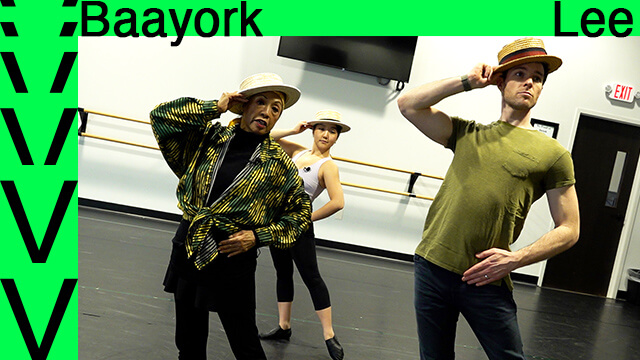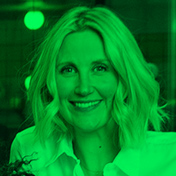
Broadway Diversified by Asian Power
Baayork Lee / Co-founder of National Asian Artists Project
A legendary New York actor and director best known for playing Connie in "A Chorus Line" now strives to create opportunities for Asian performers. She talks about racial diversity in American theater.
Here's what we talk about in this episode: Art, Creativity, Culture, Dance, Diversity, Entertainment, Equality, Inclusion, Multicultural, Music
*You will leave the NHK WORLD-JAPAN website
Draft transcript
- Alex Steullet / Host:
- I'm Alex Steullet, and this is Vision Vibes. This story was originally broadcast on television as part of NHK WORLD-JAPAN's interview series Direct Talk.
- I’ve often asked myself. Where do our life goals come from? We all have people we want to become or skills we want to improve, but why those goals and not others?
- Part of it is individual preference. For me, I love books and the power of language, so I've always wanted to become a better writer. Others are moved by movies, music, or impressive people they had a chance to meet and talk to.
- Another important influencer though is imitation. A lot of what we imagine to be possible is determined by what we see around us. We're constantly comparing ourselves to exceptional people who succeeded. We want to know how they made it so that we can make it too.
- That's why representation is so important. Today, we'll glimpse at the life and work of Baayork Lee, an Asian Broadway star who now dedicates herself to providing other Asian artists with opportunities to shine. She's helped numerous diverse artists find roles traditionally available only to white artists.
- What struggles do Asian artists face in building a career in the United States, and how is Baayork helping? Let's join narrator Stuart Varnum-Atkin and find out on today's episode of Vision Vibes.
- Stuart Varnum-Atkin / Narrator:
- In New York's Chinatown,
- Asian elementary school students are energetically working on a musical rehearsal as an after-school activity.
- The instructors are Broadway professionals. The project is organized by a non-profit organization called NAAP, the National Asian Artists Project.
- The well-known actor and director Baayork Lee, one of its co-founders, is breathing fresh air into the American theater world.
- Baayork Lee:
- When I started to direct shows, I... that's when my eyes really opened to see that the Asian actors and singers and dancers had no opportunities.
- Stuart Varnum-Atkin / Narrator:
- Baayork will talk about racial diversity in the American theater community and the role played by NAAP.
- As an Asian performer, Baayork Lee has long been active on the Broadway stage.
- She's best known for her appearance in "A Chorus Line," the musical that became a smash hit when it premiered in 1975.
- Baayork played one of the lead dancers in the premiere and joined the ranks of the stars.
- She's currently working on various initiatives for Asian theater artists.
- Baayork Lee:
- The purpose of NAAP, which is National Asian Artists Project, is to be able to give a platform for the Asian American theater performers...ah... to meet, East meeting the West, which means that they will be able to perform western musicals and plays.
- The opportunities for Asian American actors of the is not there, because they are not hired to be playing in western shows. And so, if you're not doing The King and I or Miss Saigon or Flower Drum Song, they have no work.
- So many out-of-work actors, they cannot afford singing lessons and to keep their voices up. And so, we formed a choir for them to come once a week to sing different composers and to keep their voices, um, in shape.
- Stuart Varnum-Atkin / Narrator:
- NAAP provides acting coaching, remote instruction and audition referrals, and it has so far supported more than 2,000 artists.
- NAAP also holds its own performances and creates opportunities for artists to perform.
- Baayork Lee:
- We have many, many programs for them. And what we do is we ask writers from NYU, from Columbia, professionals to submit their new musicals. We take four of them, we cut them down for 30 minutes. And we have Asian actors performing in them.
- We also have "Rediscover," which is the big musicals like Oklahoma, Carousel, Hello Dolly, Into the Woods. What else have we done? Cinderella, that is to rediscover these musicals with all-Asian cast.
- Stuart Varnum-Atkin / Narrator:
- Baayork has been putting on innovative shows in which all characters previously performed by white artists are presented by Asians.
- Thanks to her challenging new concepts, the attention paid to Asian artists in the American theater community is increasing year by year.
- Baayork Lee:
- We will also hopefully start doing plays and comedies, and Shakespeare. All of these things...the umbrella is, is very wide for, for NAAP, to introduce all of this to our community. Because we are building a community and making them aware of all of these things that are available to them.
- And also having an audience wanting to come to see Asians doing Shakespeare, Asians doing comedies, and all of those things. It's very, very important.
- Stuart Varnum-Atkin / Narrator:
- The United States is known as a racial "melting pot," but until the early years of this century, only a very limited number of non-white performers could appear on the Broadway stage. In recent years, however, the number has gradually started to rise.
- Baayork Lee:
- In the past few years, yes. There are more of diversity on Broadway, on television, in movies. Absolutely. But I really feel that the push came during the pandemic and Black Lives Matter.
- What's happening now is that all of those people, the producer, the writers, the casting people, they are opening up and seeing that we need to, to really across the board have as much diversity as possible. I think it is become more aware.
- Stuart Varnum-Atkin / Narrator:
- Baayork was born here in New York's Chinatown in 1946, to a Chinese father and an Indian mother.
- Baayork Lee:
- And New York was a boundary. We had Germantown, we had Little Italy, we had, you know, Chinatown. Oh, oh, yes, there were definitely boundaries.
- We never passed 14th street because there was no need. Everything was below 14th Street.
- Stuart Varnum-Atkin / Narrator:
- It was an appearance in the musical "The King and I" that introduced Baayork to the world of show business.
- She played one of the daughters of the Thai king, originally played by Yul Brynner.
- Baayork Lee:
- In Chinatown, we did not have theater. We didn't know what Broadway was. And so, for a casting agent to go to Chinatown looking for children for "The King and I" with Yul Brynner was very unusual.
- When I got to the theater, and I saw a chandelier for the first time, I saw people dancing on the stage, I loved it, and at five I said to my mother, "This is what I want to do!"
- Stuart Varnum-Atkin / Narrator:
- She was eager to pursue a stage career. However, times were tough for Asian performers.
- Baayork Lee:
- I can see the hardship for the Asian actor, dancer, singers in those days, because they were not hired at all.
- Stuart Varnum-Atkin / Narrator:
- Against such a backdrop, she found a way out.
- Baayork Lee:
- My journey has been, been wonderful. Because all of the shows, I would say, I was able to work as a kid, because I was not tall enough.
- Stuart Varnum-Atkin / Narrator:
- And at the age of 28, her destiny was shaped by her performance in that famous production of "A Chorus Line."
- It's a story about the hopes and disappointments of unknown dancers. Baayork played the role of an Asian American called Connie Wong.
- Baayork Lee:
- We have this Asian character. And it was really important for my community that we were um recognized.
- Michael Bennett always, always, always had diversity in his companies. This was just his way of, of using the people that he loved to work with.
- There's so many Asian girls whose career started with "A Chorus Line." This role is very important for an Asian actress/singer.
- Stuart Varnum-Atkin / Narrator:
- Today, 47 years since the first performance, Baayork is active as a director of "A Chorus Line."
- Baayork Lee:
- And I want you to sit in the hip, so that there's an S shape. Correct.
- Song: 5,6,7,8.
- Baayork Lee:
- One change. Walk, walk. Point, point, point. Flick, step, kick, halt.
- It's really hard for me to start to direct the Connies because it's my life.
- Emma X. O’Loughlin / Actress “Connie Wong”
- Right.
- Baayork Lee:
- Faster than anybody else, and be better than anybody else.
- Emma X. O’Loughlin / Actress “Connie Wong”
- Absolutely.
- Baayork Lee:
- And that only has to be with short. Can you imagine being Asian, also you know you gotta do something else on top of that.
- Emma X. O’Loughlin / Actress “Connie Wong”
- Absolutely.
- When I first got to school, when I was training at the Conservatory, I had people coming up to me telling me, "Oh, you'd be a great Connie Wong!" And to be told that I... it to do this iconic role. And to be able to do it now is such a dream.
- Stuart Varnum-Atkin / Narrator:
- For the past two years, Asian Americans have been the target of hate crimes, and protest demonstrations have been held in various cities.
- What does Baayork think about this current reality?
- Baayork Lee:
- What can I say about Asian hate, you know? I think for so many years, our community was very, very passive. And, you know, felt like second-class citizens.
- We always sat back, we never pushed for anything. I think it's part of the culture to wait and see what's gonna happen.
- And now we have this fourth, fifth-generation who are born here, and they don't know what is in China or in Japan or Vietnam. They are here, and they are going to stand up for their rights.
- I think the push now is that the younger generation, they are not going to wait. They are going to voice their opinion and they want to be heard, and they want to be seen. They want to be visible.
- Stuart Varnum-Atkin / Narrator:
- "As Asians, we no longer need to wait, we need to speak up for ourselves." It was this desire that drove her to establish NAAP.
- As well as teaching professionals, Baayork is involved in another important initiative.
- It's an activity for elementary schools called "Theater Club."
- Baayork provides the children with acting practice.
- The activity is organized by NAAP, and the operating funds are managed through donations and bazaar sales.
- Child:
- I joined this year. Because I really like singing and dancing.
- Child:
- You get to meet other people and work with them. And you get also to learn dance moves and you get to have fun.
- Baayork Lee:
- I want to give them the same opportunity that I had. What they take away is the discipline, the camaraderie, vocal abilities, their speech.
- And I am making them aware that there is something outside of the… of the school and of Chinatown. And also taking them uptown now to see shows, and also to go backstage.
- When they come to the theater club, they are free to speak and to be themselves. That is the first education that they can think for themselves.
- If they want to be in theater, as I said, I have children at the LaGuardia and some are, you know, gone on, but if they don't want to be in theater, we also need people to buy the tickets and they will appreciate going to the theater because they understand it.
- Stuart Varnum-Atkin / Narrator:
- The various awards for her contributions to the theater community and educational programs include the non-competitive, philanthropic Isabelle Stevenson Tony Award.
- Baayork Lee:
- Now, we need Asian writers, Asian producers, Asian directors, who are going to not only write for us, but tell our stories, and hire us.
- We have been invisible and very silent about being an actor or being Asian or, or whatever. But now we are visible.
- We are uniting and protesting and making more people aware that we are here and we are not going anywhere, that we eat hamburgers and Mac and cheese like everybody else. And we are going to stand our ground.
- Stuart Varnum-Atkin / Narrator:
- Baayork continues to influence many people of Asian descent living in America.
- So, what is her motto?
- Baayork Lee:
- "Never give up your dream!"
- It's really important that if you really want to be in the theater, you really want to be in this business, you don't give up. There's always a show for you. There's a place for you, and it's really important that you see it through to the end.
- Alex Steullet / Host:
- Never give up your dream.
- One of the problems I think many people have, myself included, is we compare ourselves with the very top of our fields. As a writer, I'll read Shakespeare or Dickens and think to myself, "I'll never be able to write anything that good! Why bother even trying?"
- That's where I think Baayork's advice is critical. When it's your dream, it's not about becoming the best. It's about becoming the greatest version of yourself.
- So instead of comparing ourselves to the top, we should compare ourselves to the alternative: The me who didn't try, who never pursued his dream. Compared to that guy, I'm doing pretty well. I hope you are too, and that Baayork's story inspired you to keep trying a little longer.
- That's it for today's episode. Thank you for listening. You can find the transcript, as well as our other stories, on the NHK WORLD website. I've been Alex Steullet, join us next time for more mind-expanding insights from inspiring people on Vision Vibes.
- Released on July 14, 2022
- Available until May 25, 2025
Hosts

Alex Steullet
Alex is a Swiss writer, content creator and brand communication specialist. He was born in the USSR, grew up in the United States and Switzerland, and obtained his Master's degree in human rights law in the UK. Alex started his career at the Swiss Federal Department of Foreign Affairs, where he worked for three years on humanitarian and human rights issues. In 2016, he moved to Japan. Nowadays when he isn't writing or traveling, Alex can usually be found singing his heart out at karaoke.

Chloe Potter
Chloe Potter is a broadcast journalist from London. Before moving to Tokyo in February 2020 she ran her own video production company, making content for Google, Sky, the BBC and Bloomberg. Prior to that she was a presenter for Sky News and Sky Arts. She regularly records voice overs and works as a correspondent for a British broadcaster and as a freelance presenter. She has 3 children, loves wild swimming and is an avid podcast fan.
